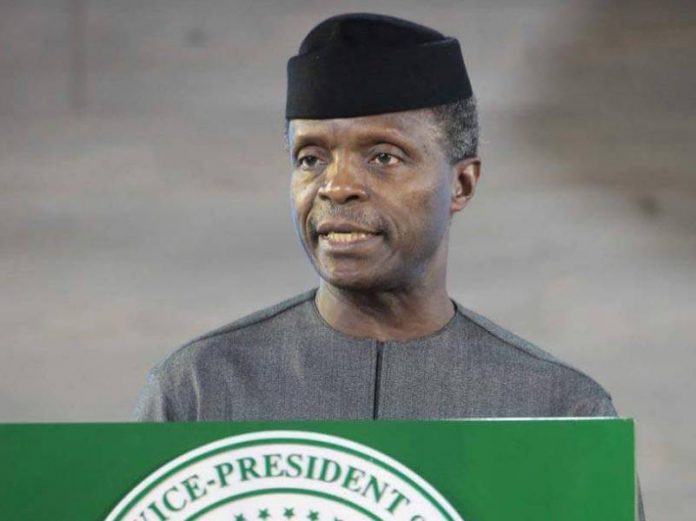Vice President Yemi Osinbajo (SAN) yesterday accused United States of America (USA), Germany, France and several other developed countries of aiding corruption in Nigeria by giving protection to corrupt politicians and stashing the proceeds of their corrupt acts in their countries.
Osinbajo said besides hiding under their laws of corporate secrecy, stolen funds are converted into properties, trusts, humongous bank accounts and other arrangements designed to cover ownership of assets, or treated in anonymity.
Osinbajo stated this at the opening ceremony of the Inter-Governmental Action Group against Money Laundering in West Africa (GIABA) 18th Ministerial Committee meeting, held in Abuja yesterday.
He said despite numerous mutual legal assistance treaties and conventions entered into with the U.S. and other G8 and G20 countries, they still install stiff obstacles to frustrate the repatriation of stolen funds stashed in bank accounts in their countries.
The vice president further asserted that it was inconceivable the sort of experience the governments of less developed countries go through and the degrading conditions they are subjected to even when such funds are to be returned.
‘’Permit me to raise a matter of considerable importance to many of our nations; it is the difficulty we experience in repatriating proceeds of corruption from financial institutions of the more developed nations.
‘’Despite numerous mutual legal assistance treaties and conventions, it is obvious that we are not making the sort of progress we expect to see. It is unconscionable, in our view, to have stolen funds in a bank within the jurisdiction of an FATF country and to have to go through a rigorous obstacle course to retrieve the fund, and even when such funds are to be returned after several years, humiliating conditions are attached.
“The other issue is the risk of the dangers posed by anonymous corporate ownership. If nothing else, the Panama Papers and now the Paradise Papers clearly illustrate the global scale and spread of this problem. So this is a global challenge and nothing less than a truly global approach will be needed to tackle it.”
He, however, commended the United Kingdom, Norway, Netherlands and Denmark for leading the way in establishing public registers of the real, human owners of companies in their countries and encouraged other G8 and G20 countries not only to follow suit but also to initiate actions to end corporate secrecy in some of their dependencies.
‘’We cannot have anonymous ownership of companies, trusts and other arrangements designed to cover ownership of assets, and at the same time expect optimal results from anti-money laundering measures,’’ Osinbajo noted.
Osinbajo reiterated that money laundering and terrorism financing were crimes that have significant consequences for the security and well-being of countries.
“In Boko Haram we have seen the devastation that a well-resourced terrorist group can wreak, not just on individual lives and livelihoods, but also on the stability of national and regional political and economic systems.
“In the last decade, more than 20,000 lives were lost to terrorism propagated by Boko Haram, and more than two million persons displaced. One important question that arises is this: How did a once-obscure sect, domiciled primarily in a single city in Northern Nigeria, evolve to become, at one point, a menace not only to the country but to the entire Lake Chad Basin?
“I’m certain that a significant part of the answer to those questions will be found in the complicated multinational networks of financing that sustained the group and nurtured its hateful vision. There is absolutely no way that Boko Haram would have grown as dangerous as it did without access to funding and resources, mobilised from far and wide.
‘’It is clear that without dealing a lethal blow to those powerful criminal networks that funnel money to terrorist groups, we cannot reasonably hope to completely obliterate the threat of terrorism and other organised criminal activities in our sub-region,”.
“What this means is that we are dealing here with an existential threat – it’s either we wipe it out or it wipes us out,’’ he said.
Director-general of GIABA, Colonel Adama Coulibaly, however, warned that the suspension of the Nigerian FIU by the Egmont Group could have a negative impact on the ability of some countries’ FIUs to effectively implement the required reforms, saying Nigeria provides mentorship for most of these countries.

